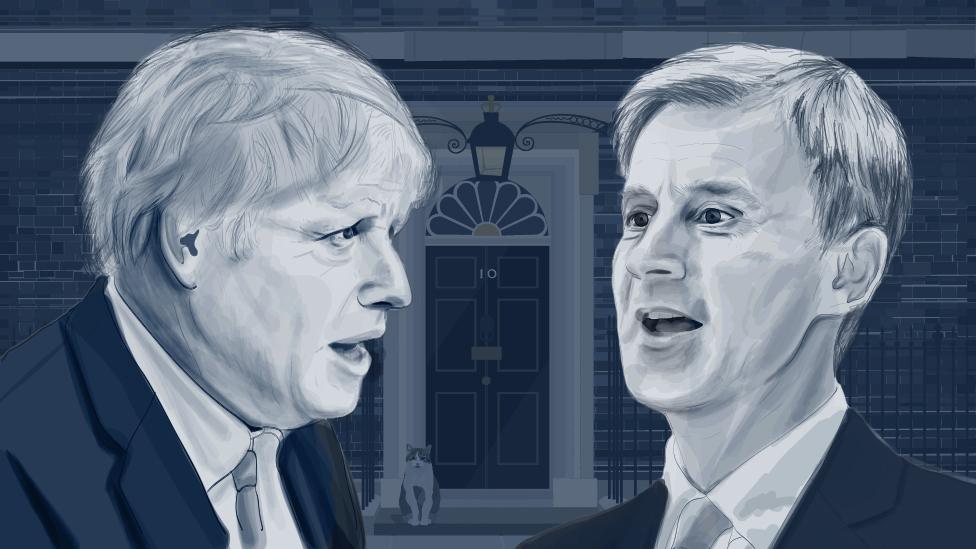Tory leadership: Hammond urges halt to spending bonanza
- Published
Hammond: Candidates' promises "exceed fiscal headroom"
For much of our recent history, when Conservatives have talked about spending public money, our money, it's been to list the reasons why they can't spend it.
Why indeed, it would be irresponsible to make promises to splash cash around without explaining exactly where it would come from.
It is true, that over the last year, there has been a bit of a thawing in that freeze. Rhetorically, Theresa May has suggested that years of squeezing budgets is coming to an end.
In reality, one of the contenders for the top job, Jeremy Hunt, managed to win the argument for a big ticket IOU for the NHS - billions extra over the long term.
And remember it has taken years longer than the government planned to close the gap between what they spend and what our taxes provide. Deficit targets proved rather more stretchy than the Conservatives promised in 2010.
Indeed, the country's debt is still eye-wateringly high, even though many of our public services are very definitely, as many members of the public know all too well, showing the stress and strain of having to do more with less.
But the priority was clear - balancing the books. And suggestions from the opposition parties that the axe was swinging too wildly were often greeted with derision.
In this leadership race, however, that seems to have fallen by the way side. Jeremy Hunt and Boris Johnson have been busy spraying around hypothetical cash - whether on defence, on care for the elderly, on schools, for more police, the list goes on.
It is not politically surprising that they both want to signal they would turn on the spending taps a bit after a long, long period of cuts. But one of their erstwhile colleagues seems to have had enough.
After making some carefully crafted warnings in the last couple of weeks, Chancellor Philip Hammond has tried to call a halt, telling the BBC that both of the candidates have to resist the temptation of a bidding war, worrying that the party's reputation is at risk too.
Mr Hammond told me the candidates needed to "stop and think". And that by his calculation, both of the candidates' plans "greatly exceeds" the amount of wriggle room they will inherit from No 11 if they are lucky enough to be the one that moves in next door.
In his view, for Boris Johnson or Jeremy Hunt to keep their promises there would need to be more borrowing, or tax increases or extra cuts elsewhere. And that is before, of course, the potential economic hit of leaving the EU without a deal - the option the two candidates say they don't want to take, but won't rule out.
In No 11's view, if that happens, all bets are off.
Here's the health warning. Philip Hammond is not so much a pin-up for Brexiteers, but the face tacked on to the dart board. He's been seen as a doom monger who's interested only in gloom, who never wants to spend any cash, and would love another referendum to stop Brexit happening.
For others in the Conservative Party, though, he is one of the last bastions of common sense. And whatever side you are on, the voice of any Chancellor is hard to ignore.
The temptation of any political campaign, of course, is to go further, to promise more, perhaps stretch the notion of what's realistic. All political parties and candidates trade in hope and ambition about what they would like to do.
But Tory critics of Mr Hunt and Mr Johnson clearly feel they are going too far this time. I asked the current chancellor if they were being honest - his answer was "they need to be careful".
And for their political opponents on the opposite benches, when these pledges come from men who were part of a government which imposed years of cuts, they might grate - evidence that Conservatives can actually reach for the cheque book, but only when they want to win.
PS: I wonder too if Philip Hammond was hoping his comments might be heard through the wall next door. As Theresa May's days in No 10 come to a close, the two are still involved in the most old fashioned of internal political battles - the prime minister wants to spend some cash, the chancellor says a big fat no.
- Published18 July 2019

